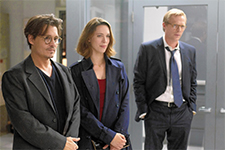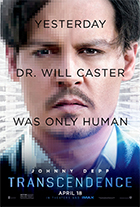Transcendence
|  Transcendence, the directorial debut of cinematographer and frequent Christopher Nolan collaborator Wally Pfister, is built on a set of intriguing moral and ethical conundrums involving our relationship with rapidly evolving computer technology, but it finds virtually no dramatic traction. Intellectually the film provides more than enough food for thought, and for that reason alone it should be given some credit, but first-time screenwriter Jack Paglen never quite figures out how to give the film’s ideas dramatic weight and emotional pull, and Pfister fails to give the story shape and momentum. For long stretches, the film just kind of sits there, as if stuck in its own perpetual motion world of techno-paranoia and emotional inertia. Transcendence, the directorial debut of cinematographer and frequent Christopher Nolan collaborator Wally Pfister, is built on a set of intriguing moral and ethical conundrums involving our relationship with rapidly evolving computer technology, but it finds virtually no dramatic traction. Intellectually the film provides more than enough food for thought, and for that reason alone it should be given some credit, but first-time screenwriter Jack Paglen never quite figures out how to give the film’s ideas dramatic weight and emotional pull, and Pfister fails to give the story shape and momentum. For long stretches, the film just kind of sits there, as if stuck in its own perpetual motion world of techno-paranoia and emotional inertia.Feigning some kind of un-identifiable faux European accent, Johnny Depp stars as Dr. Will Caster, a brilliant theorist and computer scientist who has for years been working on developing the most sophisticated artificial intelligence computer the world has ever seen (it’s call PINN, which stands for Physically Independent Neural Network), one that combines the sum of human knowledge with the intricacies of human emotion. Will is aided in his endeavors by dedicated collaborators: his wife Evelyn (Rebecca Hall) and his best friend Max Waters (Paul Bettany). While Will is the intellectual engine and Max is the grounded manager, Evelyn is the idealist-dreamer, believing that Will’s technological accomplishments will genuinely change the world for the better. And change the world they do, albeit not in the way she was imagining. Given that the film opens in a near future in which all technology has broken down and the world is subsisting without any kind of power, we know from the outset that something somewhere goes wrong, so it’s just a matter of when. The first shot comes in the form of a literal bullet fired at Will by a member of a neo-Luddite terrorist organization dedicated to destroying his research. The bullet does not immediately kill Will, but it does doom him, which is when he gets the idea of downloading his consciousness into PINN, thus cheating his own physical mortality while merging himself with an intellect and knowledge base millions of times beyond normal human capacity. He, in effect, turns himself into a kind of demi-god, albeit one who requires people on the ground to carry out his ideas, namely Evelyn, who is so blinded by her love for her husband that she fails to see how his ambitions are far outstripping what is left of his humanity (is it really Will in the machine, or just a facsimile of him?). From there, the story winds its way to a tiny, dying town in New Mexico that Evelyn makes the home base for cyber-Will’s increasingly ambitious technological dreams, while Max is kidnapped by the neo-Luddites (headed by Kate Mara’s humorless Bree) and eventually turned against his previous employers. On the margins of the story we have Morgan Freeman as another artificial intelligence researcher working with an FBI agent (Cillian Murphy) to take down the neo-Luddites. Soon, all kinds of new technologies are springing from the desert, including radically advanced medical treatments that somehow turn the patients into supercharged, virtually unkillable disciples of Will’s technological utopia. There’s more, quite a bit more, in fact, but the problem with Transcendence is that it gets so mired in its ideas—some of which are quite intriguing, others of which are decidedly half-baked—that it never builds up any real steam. The opening moments are gripping, especially when the neo-Luddites’ coordinated attacks on various AI research teams unfolds against Will giving a rah-rah speech at a major convention, thus contrasting the violence of the old with the cyber-dreams of the future. The film gets a few doses of emotional energy from Rebecca Hall, whose performance as Evelyn far outstrips the limited nature of her character, which is essentially a flesh-and-blood conduit for Will’s unmoored virtual presence. Depp, on the other hand, seems almost somnambulistic, as he appears to have confused frightening intelligence with intense boredom (it doesn’t help that he is relegated to a talking head on various computer screens for much of the film). Pfister, working with cinematographer Jess Hall (The Spectacular Now), ensures that Transcendence looks good at all times, but he fails to give it any real heart or urgency, even though by the end the fate of the world is literally hanging in the balance. The apocalypse has rarely seemed so yawn-inducing. Copyright ©2014 James Kendrick Thoughts? E-mail James Kendrick All images copyright © Warner Bros. |
Overall Rating: 
 (2)
(2)


